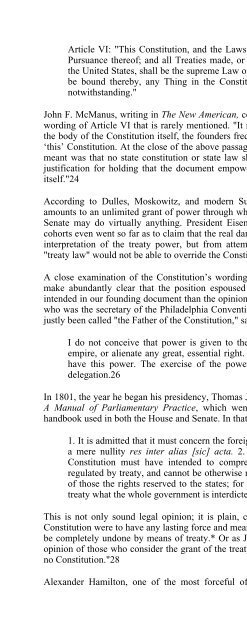Jasper-Global-Tyranny-Step-By-Step-The-United-Nations-and-the ...
Jasper-Global-Tyranny-Step-By-Step-The-United-Nations-and-the ...
Jasper-Global-Tyranny-Step-By-Step-The-United-Nations-and-the ...
Create successful ePaper yourself
Turn your PDF publications into a flip-book with our unique Google optimized e-Paper software.
Article VI: "This Constitution, <strong>and</strong> <strong>the</strong> Laws of <strong>the</strong> <strong>United</strong> States which shall be made in<br />
Pursuance <strong>the</strong>reof; <strong>and</strong> all Treaties made, or which shall be made, under <strong>the</strong> Authority of<br />
<strong>the</strong> <strong>United</strong> States, shall be <strong>the</strong> supreme Law of <strong>the</strong> L<strong>and</strong>; <strong>and</strong> <strong>the</strong> Judges in every State shall<br />
be bound <strong>the</strong>reby, any Thing in <strong>the</strong> Constitution or Laws of any State to <strong>the</strong> Contrary<br />
notwithst<strong>and</strong>ing."<br />
John F. McManus, writing in <strong>The</strong> New American, commented on an important distinction regarding <strong>the</strong><br />
wording of Article VI that is rarely mentioned. "It must be carefully noted," he observed, "that, within<br />
<strong>the</strong> body of <strong>the</strong> Constitution itself, <strong>the</strong> founders frequently referred to <strong>the</strong> document <strong>the</strong>y had crafted as<br />
‘this’ Constitution. At <strong>the</strong> close of <strong>the</strong> above passage, <strong>the</strong>y referred to ‘<strong>the</strong>’ Constitution, <strong>and</strong> what <strong>the</strong>y<br />
meant was that no state constitution or state law shall st<strong>and</strong> above <strong>the</strong> U.S. Constitution. <strong>The</strong>re is no<br />
justification for holding that <strong>the</strong> document empowers <strong>the</strong> makers of treaties to undo <strong>the</strong> Constitution<br />
itself."24<br />
According to Dulles, Moskowitz, <strong>and</strong> modern Supreme Court interpretations, however, Article VI<br />
amounts to an unlimited grant of power through which <strong>the</strong> President <strong>and</strong> two-thirds of a quorum of <strong>the</strong><br />
Senate may do virtually anything. President Eisenhower, Secretary Dulles, <strong>and</strong> <strong>the</strong>ir internationalist<br />
cohorts even went so far as to claim that <strong>the</strong> real danger to <strong>the</strong> Constitution came not from an expansive<br />
interpretation of <strong>the</strong> treaty power, but from attempts to explicitly <strong>and</strong> unequivocally guarantee that<br />
"treaty law" would not be able to override <strong>the</strong> Constitution.25<br />
A close examination of <strong>the</strong> Constitution’s wording <strong>and</strong> <strong>the</strong> "original intent" of <strong>the</strong> framers, however,<br />
make abundantly clear that <strong>the</strong> position espoused by McManus is far more in tune with what was<br />
intended in our founding document than <strong>the</strong> opinion taken by Dulles, Moskowitz, et al. James Madison,<br />
who was <strong>the</strong> secretary of <strong>the</strong> Philadelphia Convention, <strong>the</strong> principal author of <strong>the</strong> Constitution, <strong>and</strong> has<br />
justly been called "<strong>the</strong> Fa<strong>the</strong>r of <strong>the</strong> Constitution," said of <strong>the</strong> scope of <strong>the</strong> treaty power:<br />
I do not conceive that power is given to <strong>the</strong> President <strong>and</strong> <strong>the</strong> Senate to dismember <strong>the</strong><br />
empire, or alienate any great, essential right. I do not think <strong>the</strong> whole legislative authority<br />
have this power. <strong>The</strong> exercise of <strong>the</strong> power must be consistent with <strong>the</strong> object of <strong>the</strong><br />
delegation.26<br />
In 1801, <strong>the</strong> year he began his presidency, Thomas Jefferson published his authoritative reference work,<br />
A Manual of Parliamentary Practice, which went through many printings <strong>and</strong> became a st<strong>and</strong>ard<br />
h<strong>and</strong>book used in both <strong>the</strong> House <strong>and</strong> Senate. In that book, Jefferson declared of treaty power:<br />
1. It is admitted that it must concern <strong>the</strong> foreign nation, party to <strong>the</strong> contract, or it would be<br />
a mere nullity res inter alias [sic] acta. 2. <strong>By</strong> <strong>the</strong> general power to make treaties, <strong>the</strong><br />
Constitution must have intended to comprehend only those objects which are usually<br />
regulated by treaty, <strong>and</strong> cannot be o<strong>the</strong>rwise regulated. 3. It must have meant to except out<br />
of those <strong>the</strong> rights reserved to <strong>the</strong> states; for surely <strong>the</strong> President <strong>and</strong> Senate cannot do by<br />
treaty what <strong>the</strong> whole government is interdicted from doing in any way.27<br />
This is not only sound legal opinion; it is plain, common sense. If <strong>the</strong> Bill of Rights <strong>and</strong> <strong>the</strong> whole<br />
Constitution were to have any lasting force <strong>and</strong> meaning, it could not have been intended that <strong>the</strong>y could<br />
be completely undone by means of treaty.* Or as Jefferson rightly observed: "I say <strong>the</strong> same as to <strong>the</strong><br />
opinion of those who consider <strong>the</strong> grant of <strong>the</strong> treaty-making power as boundless. If it is, <strong>the</strong>n we have<br />
no Constitution."28<br />
Alex<strong>and</strong>er Hamilton, one of <strong>the</strong> most forceful of <strong>the</strong> Federalists <strong>and</strong> one who often clashed with








![The Big Lie 9-11 and Government Complicity in Mass Murder [PDF]](https://img.yumpu.com/50957077/1/190x245/the-big-lie-9-11-and-government-complicity-in-mass-murder-pdf.jpg?quality=85)








